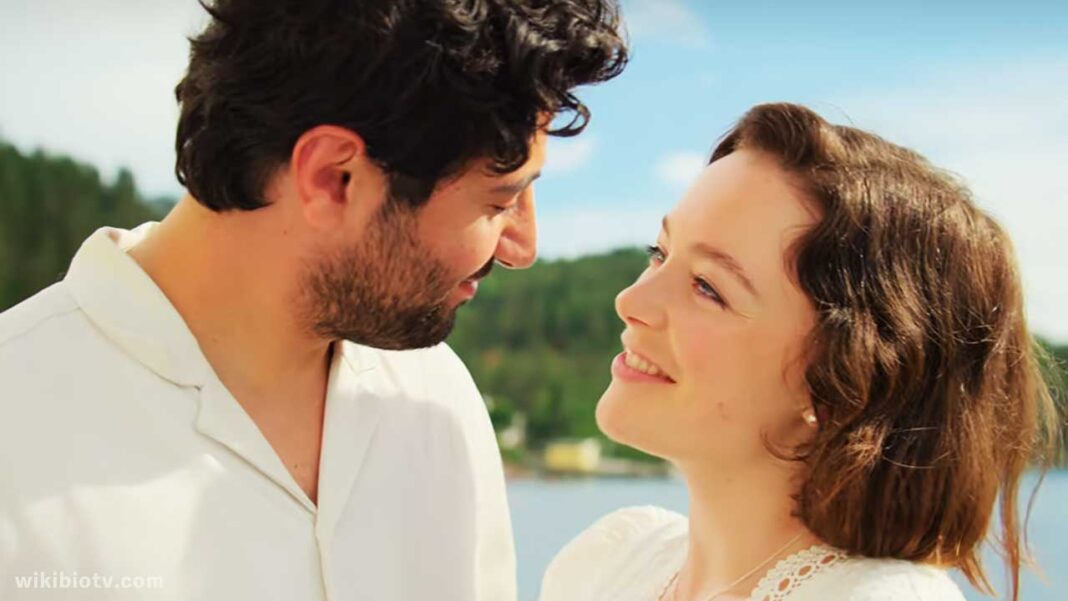
Midsummer Night Story
Carina and her husband invite close friends and family to celebrate ‘Midsummer Night’ while also sharing a very important message. Despite the revelation of some secrets, they remain united, showcasing the true meaning of love.
Midsummer Night Review
“Midsummer Night” is a captivating series that navigates the ups and downs of relationships and the twists and turns of life itself. Split into five episodes, each lasting around 27 to 31 minutes, the film strikes a perfect balance, not too long to drag on and not too short to leave out important details.
Direction and Cinematography
In this series, the visuals create a cozy vibe with soft yellow lights and glowing fires in the night sky. These sights really pull you into the story, making you feel right at home. But sometimes, this same cozy feeling starts to feel a bit dull. Instead of feeling like it’s happening now, it feels more like it’s from a long time ago. This can make it feel a bit slow and not as exciting for viewers who like more modern stuff.
“Midsummer Night” stands out for its clever use of flashbacks, seamlessly taking viewers back to important moments in the characters’ pasts. This helps us understand why they do what they do, making their actions more meaningful. However, while the flashbacks provide insight, they leave us wanting more details about the characters’ backgrounds. A bit more explanation about these past events would have made the story more interesting and engaging.
Moreover, as the story unfolds, it sometimes feels like it’s stuck on the events of just one day and the interactions among its characters. Adding more scenes to explore what happens after this important day would have made the story more exciting and engaging. While “Midsummer Night” does a great job showing us why characters act the way they do through flashbacks, it falls a bit short in giving us a full picture of their past. Still, its unique storytelling and interesting characters make it worth watching for anyone curious about human relationships and how the past influences the present.
Also read: “Midsummer Night” Plot And Ending Explained
Emotional Impact
“Midsummer Night” presents a series of episodes, each titled to give a hint about its theme, such as lust, envy, reconciliation, and forgiveness. However, the show pleasantly surprises us by revealing that life isn’t always straightforward, and that’s alright. It encourages us to accept life’s ups and downs as they come. The series opts for a tranquil approach, lacking the adrenaline rush or gripping incidents that typically keep us on the edge of our seats. Instead, it gently unfolds, leaving us with a sense of peace and reflection, without stirring much excitement.
Acting
The actors in “Midsummer Night” really shine, bringing their characters to life in a way that feels genuine and relatable. Whether they’re showing vulnerability or strength, you can’t help but feel like you’re right there with them, experiencing everything they go through. However, it would have been even more engaging if we got to see more depth to characters like Carina, understanding her past and the events that have led her to feel stuck in life, rather than just hearing about it.
Additionally, I wished we could have seen more of Håkan and his new girlfriend, as their scenes felt too brief and unclear. The conflicts and resolutions in the film seemed to happen too quickly, especially in the case of Hanne’s cheating, which didn’t feel very realistic. Overall, while the acting is superb, “Midsummer Night” could have benefited from more fleshed-out character development and more realistic pacing in its storytelling.
Themes and Messages
“Midsummer Night” leaves a lasting impact, urging viewers to reflect on their own life journeys. The film beautifully portrays the importance of kindness and empathy towards others, reminding us of the value of close relationships. However, while “Midsummer Night” delivers important lessons about forgiveness and love, its conclusion feels somewhat incomplete. The film leaves us wondering about the future of characters like Carina and her husband, as their relationship remains unresolved. Although we see Carina swimming with joy in the end, it’s unclear whether she has found freedom and decided to stay with her husband or follow her own path. This lack of closure leaves the audience wanting more, detracting from the overall experience.
Despite this, “Midsummer Night” still succeeds in delivering its message of forgiveness and love, even if it does so within the confines of a single day. It’s a film that will leave you pondering its themes long after the credits roll.
Audience Appeal
“Midsummer Night” is a calm and peaceful movie that anyone, including kids, can watch without worrying about anything scary or disturbing. However, while it’s safe for younger viewers, those under 18 may struggle to fully appreciate its profound themes exploring the complexities of life and its struggles. The film delves deep into existential questions and emotional journeys, which may be perceived as dull or uninteresting for younger audiences.
On the other hand, “Midsummer Night” is likely to resonate more with mature viewers who have traversed a significant portion of life’s path. They will find themselves drawn to the relatable situations and nuanced character dynamics portrayed in the film. With its exploration of life’s depths and challenges, older audiences are more apt to connect with the themes on a personal level, enhancing their overall viewing experience.
In summary, while “Midsummer Night” may not capture the attention of younger viewers due to its introspective nature, it holds significant appeal for older audiences seeking a reflective and contemplative cinematic journey.
Midsummer Night Final Conclusion
In its concluding moments, “Midsummer Night” delivers a heartwarming resolution that wraps up its narrative with a sense of peace and contentment. Titled ‘Forgiveness,’ the final episode encapsulates the essence of reconciliation as characters confront their past transgressions and embrace forgiveness. The sincerity in the performances, particularly during Hanne’s confrontation and the subsequent exchange of forgiveness, adds emotional depth to the scene. Johannes’ expression of remorse further underscores the theme of redemption. As the characters gather to share a meal, their bonds are strengthened, transcending mere friendship to embody the true essence of family. Lysander’s heartfelt gratitude and praise highlight the growth and unity achieved throughout the narrative. Despite the trials they’ve endured, the characters emerge stronger, their relationships fortified by honesty and understanding. “Midsummer Night” concludes on a poignant note, imparting valuable lessons about forgiveness, resilience, and the enduring power of love. For viewers seeking a heartfelt and uplifting experience, “Midsummer Night” is undoubtedly worth watching.





